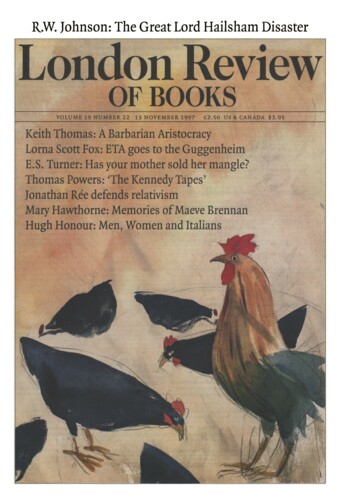Italianizzati
Hugh Honour, 13 November 1997
There is no near equivalent to A Dictionary of British and Irish Travellers in Italy 1701-1800 apart from Friedrich Noack’s three volumes (1907-27) listing all the Germans in Rome, from the Middle Ages to the 19th century. The Dictionary is the brain-child of Sir Brinsley Ford, a collector of 17th and 18th-century art, a patron of living British painters, and in many ways a reincarnation of the ideal virtuoso and Grand Tourist. He was first drawn to the subject by the Roman landscapes of Richard Wilson; published a book on Wilson’s then little-known drawings; and went on to annotate the letters written from Rome in 1757 by a minor British painter who had mentioned Wilson and other British travellers and expatriates in the city. This led him to scour printed sources and consult Roman parish registers, then in the Vatican – tall, slender volumes in which, year by year and parish by parish, priests recorded every man, woman and child in the city, their attempts to spell foreign names providing not a few problems for the modern researcher. Widening his field of enquiry to the whole Italian peninsula and the whole of the 18th century, Brinsley Ford then began to read and make transcriptions from hundreds, if not thousands, of manuscript letters and diaries in British libraries, the Public Record Office and private archives. His generosity in sharing the results of his research with other students and scholars became all too well known and, at the age of 80, under constant demands for help, he passed his archive to the Paul Mellon Centre in London, which has now published it as this Dictionary, under the editorship of John Ingamells.’

